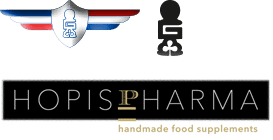Description
CHARACTERISTICS OF THE PRODUCT
Baicalein is a natural flavone (a type of flavonoid) mainly found in the roots of the Scutellaria baicalensis Georgi. It is used in traditional Chinese medicine (TCM) and in Japanese kampo. In MTC it has shown interesting property.
the indications according to traditional Chinese medicine do not in any way want to replace western medicine and medical advice.join
INGREDIENTS
- SCUTELLARIA BAICALENSIS GEORGI RADIX DRIED EXTRACT titrated at 98% in Baicalein*
HOW TO USE IT
1 capsule per day on a full stomach.
DAILY DOSES
Scutellaria baicalensis Radix 500 mg
of which Baicalein 490 mg
PACKAGE
150 cps. 500 mg each
*country origin R.P. China
BIBLIOGRAPHY
De Carvalho, R.S.M.; Duarte, F.S.; De Lima, T.C.M. Involvement of GABAergic non-benzodiazepine sites in the anxiolytic-like and sedative effects of the flavonoid baicalein in mice. Behav. Brain. Res., 2011, 221, 75-82. CrossRef DOI: http://dx.doi.org/10.1016/ j.bbr.2011.02.038
-Wang Y. H., Yu H. T., Pu X. P. & Du G. H. Baicalein prevents 6-hydroxydopamine-induced mitochondrial dysfunction in SH-SY5Y cells via inhibition of mitochondrial oxidation and up-regulation of DJ-1 protein expression. Molecules 18, 14726–14738 (2013).
-Liu A. et al. Baicalein protects against polymicrobial sepsis-induced liver injury via inhibition of inflammation and apoptosis in mice. Eur. J. Pharmacol. 748, 45–53 (2015).
-Mabalirajan U. et al. Baicalein reduces airway injury in allergen and IL-13 induced airway inflammation. PLoS One 8, e62916 (2013).
-Guo Z. et al. Baicalein inhibits prostate cancer cell growth and metastasis via the caveolin-1/AKT/mTOR pathway. Mol. Cell. Biochem. 406, 111–119 (2015).
-Georas S. N. & Rezaee F. Epithelial barrier function: At the frontline of asthma immunology and allergic airway inflammation. J. Allergy Clin. Immunol. 134, 509–520 (2014).
-Mabalirajan U. et al. Baicalein reduces airway injury in allergen and IL-13 induced airway inflammation. PLoS One 8, e62916 (2013).
-Lee J. Y., Kim J. M. & Kim C. J. Flavones derived from nature attenuate the immediate and late-phase asthmatic responses to aerosolized-ovalbumin exposure in conscious guinea pigs. Inflamm. Res. 63, 53–60 (2014).
-Yun M. Y. et al. Therapeutic effects of Baicalein on atopic dermatitis-like skin lesions of NC/Nga mice induced by dermatophagoides pteronyssinus. Int. Immunopharmacol. 10, 1142–1148 (2010).
-Kimata M., Inagaki N. & Nagai H. Effects of luteolin and other flavonoids on IgE-mediated allergic reactions. Planta Med. 66, 25–29 (2000).
– Kimata M, Shichijo M, Miura T, Serizawa I, Inagaki N, Nagai H. Effects of luteolin, quercetin and baicalein on immunoglobulin E-mediated mediator release from human cultured mast cells. Clin. Exp. Allergy 2000;30:501- 508.
–Dubravko Jelić, Agnieszka D. Lower-Nedza, Adelheid H. Brantner, et al., “Baicalin and Baicalein Inhibit Src Tyrosine Kinase and Production of IL-6,” Journal of Chemistry, vol. 2016, Article ID 2510621, 6 pages, 2016. doi:10.1155/2016/2510621
–B. Q. Li, T. Fu, W.-H. Gong et al., “The flavonoid baicalin exhibits anti-inflammatory activity by binding to chemokines,” Immunopharmacology, vol. 49, no. 3, pp. 295–306, 2000.
-T. Nagai, R. Moriguchi, Y. Suzuki, T. Tomimori, and H. Yamada, “Mode of action of the anti-influenza virus activity of plant flavonoid, 5,7,4′-trihydroxy-8-methoxyflavone, from the roots of Scutellaria baicalensis,” Antiviral Research, vol. 26, no. 1, pp. 11–25, 1995.






